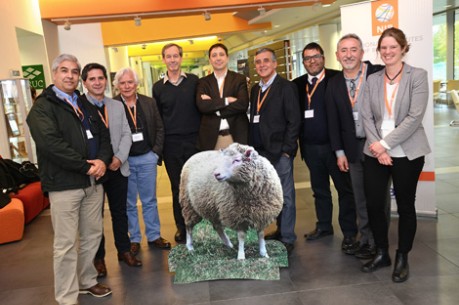Friday 4th November 2016, 2:00pm
A delegation from Chilean universities and research organisations visited the National Institutes of Bioscience (NIB) institutes from 17 to 19 October.
The visit was part of a Newton funded institutional skills project to gain knowledge and experience on how research centres operate in the UK.

The visit started at The Roslin Institute where they learned how the National Institutes of Bioscience operates, heard about the new Roslin Innovation Centre and met group leaders and researchers from the Institute.
The day finished with a talk from Edinburgh’s public engagement network, Beltane.
Photo L to R: Juan Carlos Sáez (Universidad Catolica de Chile), Ariel Orellana (Universidad Andrés Bello), Alfonso González (Universidad Catolica de Chile), David Hume (The Roslin Institute), Alexis M Kalergis (Universidad Catolica de Chile), Sergio Lavandero (Universidad de Chile), Andree Henriquez (Universidad de Chile), Haroldo Salvo (CONICYT) and Maria Mesonero (Universidad Catolica de Chile)
The visit was organised by the Universidad Catolica de Chile in conjunction with the National Institutes of Bioscience and included visitors from: Universidad de Chile, Universidad Catolica de Chile, Universidad Andrés Bello, Universidad de Concepción and the Chilean funding agency CONICYT.
This visit was also the opportunity to build on existing links NIB institutes have with Chile as well as forming new ones.
The delegation also travelled to Cambridge to visit the Babraham Institute. Whilst here they observed the NIB international meeting and heard from the various institutes about their international activities. After a networking lunch there was a talk from the institute director Michael Wakelam and talks from researchers. Lastly they heard from the Babraham Research Campus about their work and how they operate their knowledge exchange and commercialisation activities.
There will be a reciprocal visit at the end of November where representatives from UK institutes will travel to Chile to continue the project.